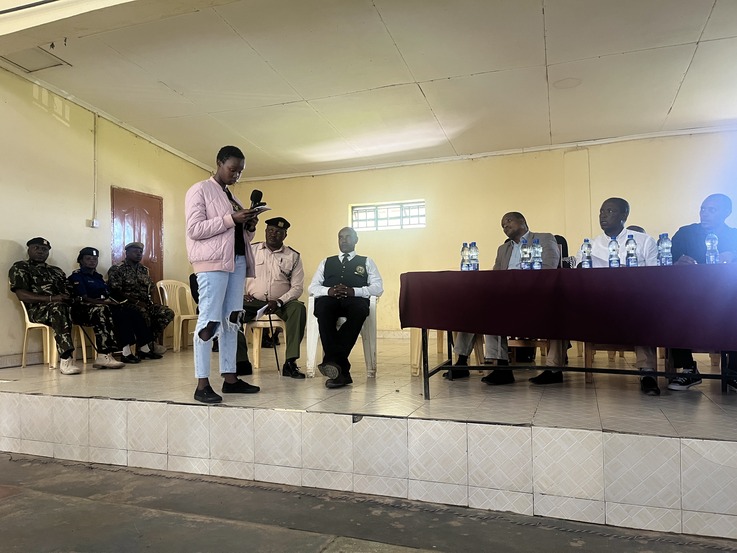At 17, Charles Ngare was walking home when the British army asked him to help get their land rover out of a ditch. He did, but it slid and crushed him, breaking his leg. The army dumped him at the hospital, and pretended they had found him in the road.
Both men stood in Nanyuki, Kenya, in front of hundreds of community members and local politicians to discuss their treatment by the British Army Training Unit in Kenya (BATUK) — just twenty minutes away from their US$85-million base.
They spoke on the first of three days of public hearings held by the Kenyan government until Thursday to “investigate the allegations of human rights violations, including mistreatment, torture, unlawful detention, and killings” by the BATUK. After years of grievances, the Committee on Defense, Intelligence, and Foreign Relations was finally getting involved.
The British army has previously insisted they can’t be sued in Kenya, claiming “sovereign immunity” from legal action in the country. But in March 2022, after a fire started by BATUK destroyed over 10,000 acres of land, a Kenyan court ruled that people affected by the environmental damage had the right to sue them.
Since that ruling, more than 7,000 claims have been filed in a lawsuit in Kenya against BATUK from those allegedly experiencing health issues from the blaze. The British army also recently admitted to using white phosphorus, an extremely toxic chemical, on the training grounds.
“This is a losing relationship for the community,” said Kelvin Kubai, a lawyer at African Centre for Corrective and Preventive Action who is leading the case, at the first hearing. “It is an injustice to the people of Kenya.” Kubai submitted a memorandum to the committee on May 28 on the “several unspeakable atrocities” allegedly committed by the army.
“The British High Commission in Nairobi and BATUK intend to cooperate with the inquiry,” a Ministry of Defense spokesperson told OCCRP in an email. “The UK-Kenya defense partnership is one of the great strengths of our relationship and our joint training and operations with the Kenyan Defence Forces are keeping both Kenyan and British people safe.”
In Nanyuki, the anger was palpable. Ngare, whose leg was broken trying to help the BATUK, claimed he received no reparations for his injuries. “Not even my hospital bills,” he told OCCRP. “My leg is still crooked.”
Local politicians, religious leaders, and village elders, all alleged abuses — from health issues to rapes — by British army soldiers and called for compensation. “It's cover up after cover up after cover up,” said politician Sarah Paulete Korere, who represents the Laikipia north area. “Kenya is not a colony of the British, we are a free country.”
In the community hall in the center of Nanyuki, Esther Njoki stood up to plead with the committee. In 2012, the body of her aunt, Agnes Wanjiru, a 21-year-old mother, was discovered in a septic tank of a hotel with stab wounds. Nearly a decade later, The Times reported that a soldier had confessed to his comrades to killing her, and showed them her body. He has still not been charged.
 Esther Njoki speaking to the Committee at Nanyuki Social Hall. (Photo: Georgia Gee, OCCRP)“We take all allegations made against U.K. service personnel seriously, and they are investigated swiftly by the service authorities or the host nation authorities“ the Ministry of Defence spokesperson told OCCRP. “We expect very high standards of behavior of our personnel, whether they are on or off duty.” They added that Wanjiru’s case “is a priority for the U.K. government.”
Esther Njoki speaking to the Committee at Nanyuki Social Hall. (Photo: Georgia Gee, OCCRP)“We take all allegations made against U.K. service personnel seriously, and they are investigated swiftly by the service authorities or the host nation authorities“ the Ministry of Defence spokesperson told OCCRP. “We expect very high standards of behavior of our personnel, whether they are on or off duty.” They added that Wanjiru’s case “is a priority for the U.K. government.”
Last week, Neil Wigan, the British High Commissioner to Kenya had met with members of Wanjiru’s family, and reiterated “the U.K.'s continued commitment to cooperate fully with the Kenyan investigation into Wanjiru's death.” An investigation was opened in 2019, but no results have been made public.
“Perhaps they think they can get away with it because their victims are African,” Njoki said. “12 years of frustration, enough is enough.”



